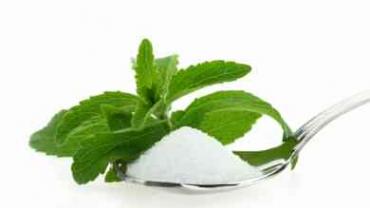
Given that our cells depend on sugar for energy it's no surprise that many of us crave a little added sweetness from time to time. Unfortunately many doctors nutritionists researchers and journalists understand that our runaway sugar habit is one of the primary causes of the obesity epidemic and metabolic disorders like diabetes as well as a culprit in cardiovascular disease.
Non-caloric artificial sweeteners abound but many have questions about their safety and healthfulness. Could stevia fill the gap as a safe potentially even health promoting alternative to added sugars and fructose? What should we make of this intensely sweet little leaf that has started popping up in everything from sodas to snack foods?
What is Stevia?
In its raw and living form Stevia rebaudiana is a shrub in the Aster family native to South America. Its super-sweet leaves have been used for centuries by indigenous peoples in Paraguay and Brazil both medicinally and as a sweetener. Stevia has been marketed as a non-caloric sweetener in Brazil and Japan for over 20 years but has only somewhat recently received FDA GRAS status in the US for use as a food additive and sweetener. It has been available for use as a nutritional supplement in the US since the 1990s.
Although stevia is grown commercially in South America and other warm climates it also thrives during the summer months in many parts of the US. If you nibble on a stevia leaf from the garden you'll notice surprising sweetness (somewhere in the neighborhood of 15x that of sugar) as well as slight bitter/licorice aftertaste. It owes its flavor profile to a range of steviol glycosides predominantly stevioside and rebaudioside. Of these compounds stevioside is the most abundant while rebaudioside is said to be the best tasting with less bitterness than stevioside. When isolated rebaudioside is 350-450 times sweeter than sugar.
Stevia can be used fresh can be dried and ground or easily turned into a liquid extract all in a home kitchen. A quarter teaspoon of ground leaves can replace approximately one teaspoon of sugar. You can buy whole or crushed stevia leaves but most often you are getting a refined version of the plant's isolated sweet compounds. Typically raw or natural stevia products will use the full range of glycosides from whole leaf stevia whereas more processed brands isolate Rebaudioside A (Reb A) often mixing it with sugar alcohols.
Potential Benefits
Most of the research on stevia uses either the whole leaf crude extracts or stevioside which have been shown to have antidiabetic antihypertensive anti-inflammatory anti-neoplastic and anti-viral effects.
In one randomized placebo-controlled trial in 174 Chinese men and women use of oral stevioside (500mg stevioside powder three times daily) significantly decreased systolic blood pressure over a two-year period with no significant adverse effects. Keep in mind however that the doses used in the study would be difficult to reach simply using stevia as a sweetener!
One concern with the use of non-caloric sweeteners is the potential for negative impacts in satiety leading to rebound eating.In one recent study looking at stevia's effect on satiety and postprandial glucose and insulin levels it was found that participants who consumed stevia vs. sucrose or aspartame prior to a meal did not compensate by consuming more calories in subsequent meals and had significantly lower postprandial glucose and insulin levels than with both sucrose and aspartame groups. In vitro and animal studies have demonstrated that stevioside stimulates the production of insulin in the pancreas and increases cellular insulin sensitivity which may be the mechanism behind stevia's blood sugar lowering effects.
Given its non-caloric and zero glycemic index nature Stevia is considered to be safe for use by diabetics and may also be a good choice for those trying to reduce sugars in their diet due to candida overgrowth.
Safety and Concerns
Few long-term studies have been done using rebiana but they have shown it to be safe thus far having no impact on blood sugar blood pressure or fertility. Studies with type 1 and 2 diabetics as well as those with hyper and hypotension have all shown no adverse effects with Reb A doses of approximately 4 to 15 mg/kg body weight per day. After several reviews the Joint Food and Agriculture Organization (FAO) of the United Nations and World Health Organization (WHO) Expert Committee on Food Additives (JECFA) concluded that rebiana poses no major toxicity or genotoxicity risks.
Bottom Line
Stevia may help to provide a bit of natural added sweetness to the diets of those who are looking to restrict carbohydrate intake reduce glycemic index or lower total caloric intake. So consider it to sweeten tea or coffee for example or perhaps in baking an occasional indulgence.